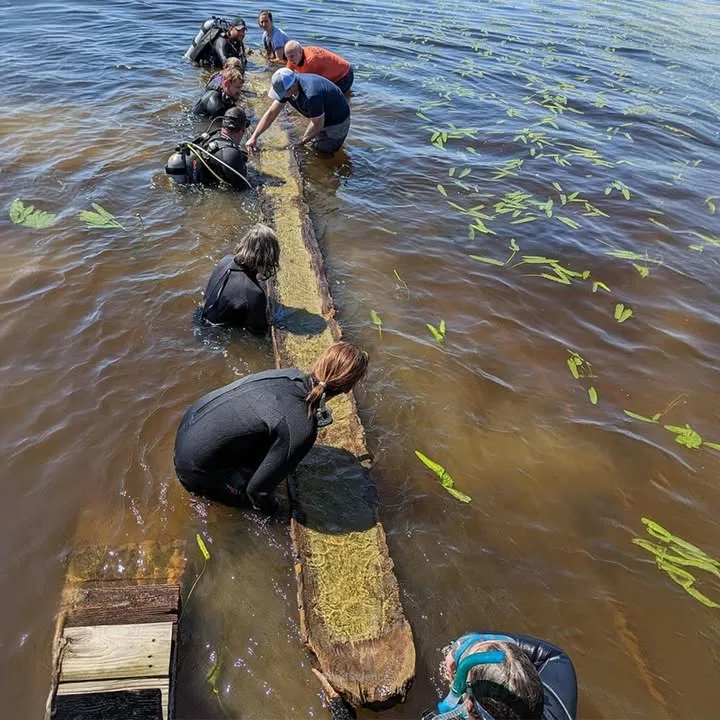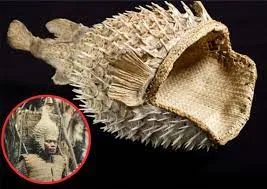In a moment of profound connection to their past, the Waccamaw Siouan Tribe witnessed the retrieval of a 1,000-year-old canoe from Lake Waccamaw in southeastern North Carolina, an event that brought tribal elders to tears. This 28-foot dugout canoe, a rare artifact of Native American history, emerged from the waters on April 12, 2023, in a collaborative effort involving tribe members, archaeologists, and local residents. The discovery, sparked by a chance encounter two years ago, is not just a find—it’s a bridge to a heritage long obscured.

A Serendipitous Discovery
In the summer of 2021, three teenagers—Eli Hill, Jackson Holcomb, and Creek Hyatt—were swimming in the 9,000-acre Lake Waccamaw in Columbus County when they stumbled upon what they thought was a log. “I stepped on it and tried to pick it up, but it never came up,” Eli Hill shared with WECT. “We kept digging, and it just kept going.” The next day, their curiosity confirmed it was no ordinary log but a massive canoe, buried in the lakebed.
The teens’ family alerted the North Carolina Office of State Archaeology, which carefully relocated the canoe closer to their pier, where it remained submerged for two years to protect its delicate wood. On April 12, a team including Waccamaw Siouan members and state archaeologists brought the canoe to the surface, a moment of deep significance for the tribe.
A Symbol of Resilience and Identity
For the Waccamaw Siouan Tribe, one of eight state-recognized Native American tribes in North Carolina, the canoe is a tangible link to their ancestors. Chief Michael Jacobs described the emotional scene to CBC: “Our elders sat on the bank and cried tears of joy, tears of sadness, tears for our youth’s future—knowing this will help them overcome the trauma of exclusion and being deemed unworthy.” The canoe, believed to be around 1,000 years old, offers physical proof of the tribe’s deep roots in the region, aligning with oral histories that place their people at Lake Waccamaw for millennia.
“That canoe at 28 feet long would have carried many a brave,” Jacobs told WECT, envisioning the warriors or families it once ferried. “It’s a history we’re still exploring, the first time we’ve had access to something like this.” To CBC, he added, “It’s like a man who only heard about his mother, and now you finally get to meet her.” For the tribe’s youth, the canoe is a touchstone, a way to connect with their heritage and heal from historical marginalization.
A Collaborative Effort
State archaeologist John Mintz emphasized the importance of involving the Waccamaw Siouan in the retrieval. “This canoe is about 1,000 years old, a southeastern Indian canoe originating from this area,” he told WECT. “We wanted the local Indian group to be part of it and share in its significance.” The operation saw tribe members, archaeologists, and neighbors working together, with dozens of Waccamaw Siouan citizens witnessing the event, some praying and singing over the canoe as it emerged.
Preservation and Public Display
To ensure its longevity, the canoe is now undergoing chemical preservation at the Queen Anne’s Revenge Conservation Laboratory in Greenville, North Carolina. This process will stabilize the wood, which has been submerged for centuries, preventing deterioration. On April 22, 2023, the public will have a chance to view this historic artifact at an open house at the laboratory, offering a rare glimpse into Native American craftsmanship and history.
A Legacy Unearthed
The canoe’s discovery not only enriches our understanding of the Waccamaw Siouan’s heritage but also underscores the resilience of Native American cultures in the Southeast. As Chief Jacobs noted, it provides “concrete evidence” to support oral traditions, affirming the tribe’s presence in the region long before colonial contact. The artifact, soon to be housed on Waccamaw Siouan lands in Buckhead, is the first of its kind for the tribe, with hopes for more discoveries to follow.
Have you been moved by a historical find like this one? Share your thoughts below or check out discussions on X for more on Native American heritage and archaeological discoveries. For those in North Carolina, don’t miss the open house at Queen Anne’s Revenge Conservation Laboratory to see this incredible piece of history up close!


